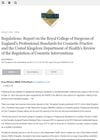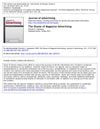73 citations,
October 2013 in “International Journal of Cosmetic Science” Chemical hair straightening can damage hair and health, needing safer alternatives and stricter regulations.
 58 citations,
March 2013 in “Human Reproduction Update”
58 citations,
March 2013 in “Human Reproduction Update” Products should be called 'sperm-safe' only after thorough, well-designed tests.
 34 citations,
September 1992 in “Journal of the American Academy of Dermatology”
34 citations,
September 1992 in “Journal of the American Academy of Dermatology” Dermatologists need to know about cosmetics to help patients with skin issues and recommend safe products.
 2 citations,
January 2019 in “Applied clinical research, clinical trials and regulatory affairs”
2 citations,
January 2019 in “Applied clinical research, clinical trials and regulatory affairs” Different countries have regulations to ensure the safety of hair care products, with some recalling hair straighteners due to high formaldehyde.
 193 citations,
January 2015 in “International journal of trichology”
193 citations,
January 2015 in “International journal of trichology” Dermatologists need to understand hair products to treat hair and scalp issues better.

Nanocarriers with plant extracts show promise for safe and effective hair growth treatment.
 November 2024 in “Journal of Scientific Agriculture”
November 2024 in “Journal of Scientific Agriculture” Silk proteins are great for cosmetics because they protect and improve skin and hair while being eco-friendly.
 November 2022 in “Nihon Nyuusankin Gakkaishi/Nihon Nyūsankin Gakkaishi”
November 2022 in “Nihon Nyuusankin Gakkaishi/Nihon Nyūsankin Gakkaishi” The lotion with N793 strain significantly increased hair density and reduced hair loss safely.
 July 2013 in “Hair transplant forum international”
July 2013 in “Hair transplant forum international” The UK published guidelines recommending that only qualified medical professionals should perform cosmetic procedures, with the possibility of these guidelines influencing future laws.
 9 citations,
March 1981 in “Journal of Advertising”
9 citations,
March 1981 in “Journal of Advertising” Magazines should self-regulate and collaborate to stop deceptive ads and protect consumers.
 18 citations,
December 2021 in “Foods”
18 citations,
December 2021 in “Foods” Seaweeds contain beneficial compounds with potential uses in food, cosmetics, and health, but more research is needed to improve extraction and safety.
17 citations,
February 2021 in “Journal of Social Philosophy” Beauty standards cause widespread harm and need collective action to address.
 12 citations,
September 2022 in “Foods”
12 citations,
September 2022 in “Foods” Some nutraceuticals may help in COVID-19 prevention and treatment, but more research is needed.
March 2024 in “Molecules/Molecules online/Molecules annual” Enzymatically extracted bear oil has more unsaturated fats and significantly increases hair growth in mice.
 183 citations,
January 2018 in “Cosmetics”
183 citations,
January 2018 in “Cosmetics” Essential oils in cosmetics can offer benefits but may cause allergies and should be used carefully.
 December 2024 in “Animals”
December 2024 in “Animals” Tithonia diversifolia extract improved digestion but didn't enhance lamb growth.
 4 citations,
September 2012 in “Clinical Pharmacology in Drug Development”
4 citations,
September 2012 in “Clinical Pharmacology in Drug Development” Different drug doses approved in Japan and the U.S. are not mainly due to different clinical responses, and ethnic factors should be considered in setting drug doses.
 67 citations,
June 2018 in “Engineering in Life Sciences”
67 citations,
June 2018 in “Engineering in Life Sciences” Plant cell culture is a promising method for creating sustainable and high-quality cosmetic ingredients.
 3 citations,
December 2022 in “Nutrients”
3 citations,
December 2022 in “Nutrients” Limonin from young citrus fruits may help with hair growth by affecting cell growth and hair cycle pathways.
 37 citations,
May 2003 in “Journal of Consumer Marketing”
37 citations,
May 2003 in “Journal of Consumer Marketing” The debate on direct-to-consumer pharmaceutical ads continues, with consumers finding them educational and doctors concerned about their impact on patient relationships and medication understanding.
 27 citations,
September 2018 in “Nanomedicine: Nanotechnology, Biology and Medicine”
27 citations,
September 2018 in “Nanomedicine: Nanotechnology, Biology and Medicine” Further research is needed to improve hair regeneration using stem cells and nanomaterials.
10 citations,
June 2011 in “PubMed” Most skin care products are safe during pregnancy, but avoid hydroquinone and tretinoin.
 60 citations,
June 2019 in “Ageing Research Reviews”
60 citations,
June 2019 in “Ageing Research Reviews” Fat from the body can help improve hair growth and scars when used in skin treatments.
January 2025 in “Molecules” Caffeine may help with hair loss, but more research is needed to confirm its effectiveness.
 1 citations,
January 2013 in “Springer eBooks”
1 citations,
January 2013 in “Springer eBooks” Cosmeceuticals may benefit skin health but need more research for efficacy and safety confirmation.
 87 citations,
March 2000 in “American Journal of Clinical Dermatology”
87 citations,
March 2000 in “American Journal of Clinical Dermatology” Alpha-hydroxy acids, like glycolic acid, safely improve skin issues and work on all skin types.
 72 citations,
July 2003 in “Journal of cosmetic dermatology”
72 citations,
July 2003 in “Journal of cosmetic dermatology” Frequent hair coloring and styling can damage hair and cause breakage or loss.
13 citations,
March 2017 in “Skin Research and Technology” Formaldehyde damages curly hair more than glyoxylic acid.
 6 citations,
January 2018 in “Elsevier eBooks”
6 citations,
January 2018 in “Elsevier eBooks” The U.S. FDA regulates cosmetics for appearance purposes, but not as strictly as some other countries.
 January 2025 in “Current Issues in Molecular Biology”
January 2025 in “Current Issues in Molecular Biology” Certain plant extracts may help prevent hair loss and promote hair growth safely.























